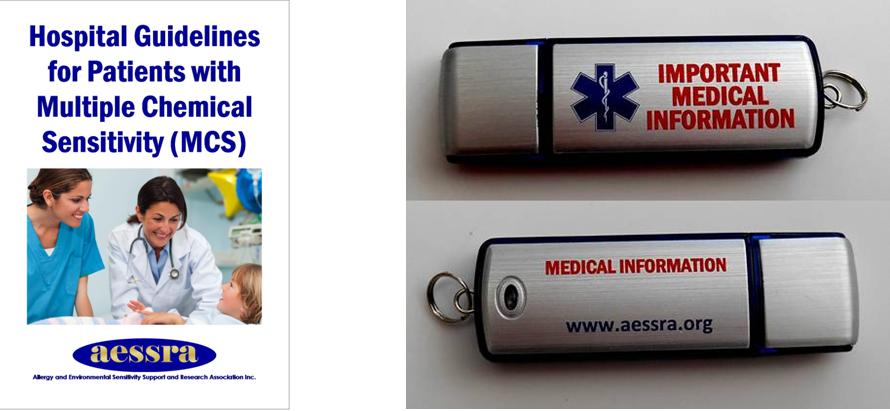AESSRA Hospital Guidelines on USB Drive with space for your personal medical information

AESSRA Inc.'s 12 A4 page Hospital Guidelines for Patients with Multiple Chemical Sensitivity is available to members as a booklet printed with low VOC soy ink on recycled paper and as a pdf on a USB drive with space for personal medical information. Contents: Emergency, Hospital staff, Admission, Babies and children, Patient’s room, Medications, Medical devices and surgery, Diet, Cleaning, Non-toxic and fragrance-free cleaning products, Non-toxic and fragrance-free personal care products, Pesticides, Further information.
MCS and Australian hospitals
Multiple Chemical Sensitivity (MCS) is recognised as a disability for the purposes of the Disability Discrimination Act. This means that people with MCS have a right to have access to hospitals. For more information see the Australian Human Rights Commission’s Access to Buildings and Services: Guidelines and Information, particularly the section ‘Use of chemicals and materials’: https://www.humanrights.gov.au/sites/default/files/content/disability_rights/buildings/good/Guidelines.doc and D.D.A. guide: The ins and outs of access: http://www.hreoc.gov.au/disability_rights/dda_guide/ins/ins.html.
There are two approaches to making hospitals more accessible to people with MCS. One is to follow an MCS protocol, guidelines or doctor’s instructions when someone with MCS is a patient (or visitor) in the hospital. The other is to improve indoor air quality in the hospital. The second approach won’t cover all the special needs of patients with MCS, but for some problems it is more effective and it also makes the hospital a healthier place for other patients (particularly those with other conditions that can be aggravated by indoor air pollution, such as asthma), staff and visitors.
AESSRA Inc. first published Hospital guidelines for patients with Multiple Chemical Sensitivity (a 12 page booklet) in 2002. Hospitals are welcome to email us requesting a pdf copy, and can adapt or adopt relevant items. (Booklets printed with soy ink on recycled paper and USB drives with a pdf copy are available to AESSRA members.)
In 2010 SA Health produced Multiple Chemical Sensitivity Guidelines for South Australian Hospitals: http://sacfs.asn.au/download/MCSHospitalGuidelines-peh-sahealth-1005.pdf. These guidelines are not adequate for many people with MCS because they contain no advice about the special needs of babies and children with MCS, how to provide meals for people with MCS, or the problems of plastic oxygen masks, chlorinated tap water, mattresses, pesticides, paint or the need to keep patients with MCS away from other patients and visitors wearing fragrance.
Multiple Chemical Sensitivity: A Guide for Victorian hospitals: http://docs.health.vic.gov.au/docs/doc/Multiple-Chemical-Sensitivity:-A-guide-for-Victorian-hospitals is largely adapted from the SA Health guidelines and has inherited the same shortcomings. Note that this guide says,
“The purpose of this MCS Guide is to provide guidance and raise awareness of the need for hospitals to develop local policies/guidelines for patients with MCS that take into account each patient’s condition, care requirements and local environmental factors.”
The WA Country Health Service Multiple Chemical Sensitivity / Chemical Hypersensitivity Guideline http://www.parliament.wa.gov.au/publications/tabledpapers.nsf/displaypaper/3814445c4f180533eea73781482579f2000ec798/$file/4445.pdf is also largely based on the SA Health guidelines and so has shortcomings. However, the Appendix with space for patients to list what they are sensitive to, the reactions they get and remedies/ways to minimise reactions may be helpful. The AESSRA Hospital Guidelines cover the issues mentioned above and further information is also available from the following sources.
The Canberra Hospital and Health Services Standard Operating Procedure: Multiple Chemical Sensitivities (MCS) - Care of Patients have additional information. Go to http://health.act.gov.au/ and put "MCS" in the search box.
In NSW “Reasonable accommodations should be made to support people who identify as having MCS and who have a treatment plan by a registered medical practitioner when they attend NSW Health facilities.” NSW Health Multiple Chemical Sensitivity Disorder factsheet
Overseas resources
IEQ Indoor Environmental Quality http://www.access-board.gov/research/ieq/index.cfm which includes detailed recommendations for choosing disinfectants and other products and an example of a hospital MCS protocol. Published by the U.S. National Institute of Building Sciences (NIBS), with funding support from The Architectural and Transportation Barriers Compliance Board (Access Board)
Risks to Asthma Posed by Indoor Health Care Environments: A Guide to Identifying and Reducing Problematic Exposures (Health Care without Harm 2006)http://www.noharm.org/lib/downloads/cleaners/Risks_to_Asthma_Guide.pdf
When the hospital makes you sick (Catherine McIver, Health Issues 93 December 2007)
Western Health Scent-Free Environment Policy http://westernhealth.nl.ca/uploads/PDFs/Western_Health_Scent_Free_Environment_Policy.pdf
CDC Indoor Environmental Quality Policy (this policy applies to all workers at all CDC facilities) http://www.drsteinemann.com/Resources/CDC%20Indoor%20Environmental%20Quality%20Policy.pdf
Scent-free policy for the workplace Canadian Centre for Occupational Health and Safety http://www.ccohs.ca/oshanswers/hsprograms/scent_free.html
For further information about fragrance and a short list of readily available fragrance-free personal care products, see the Fragrance page on this website.
